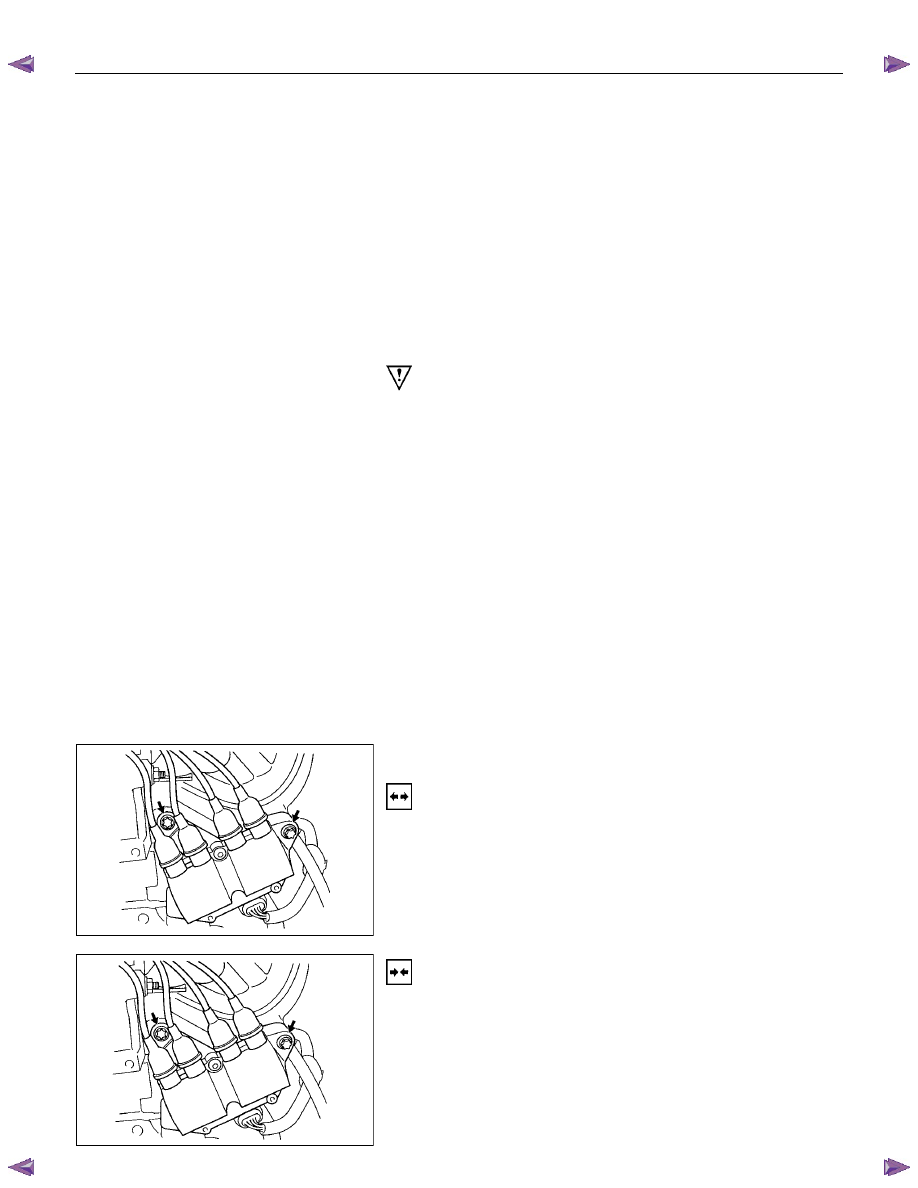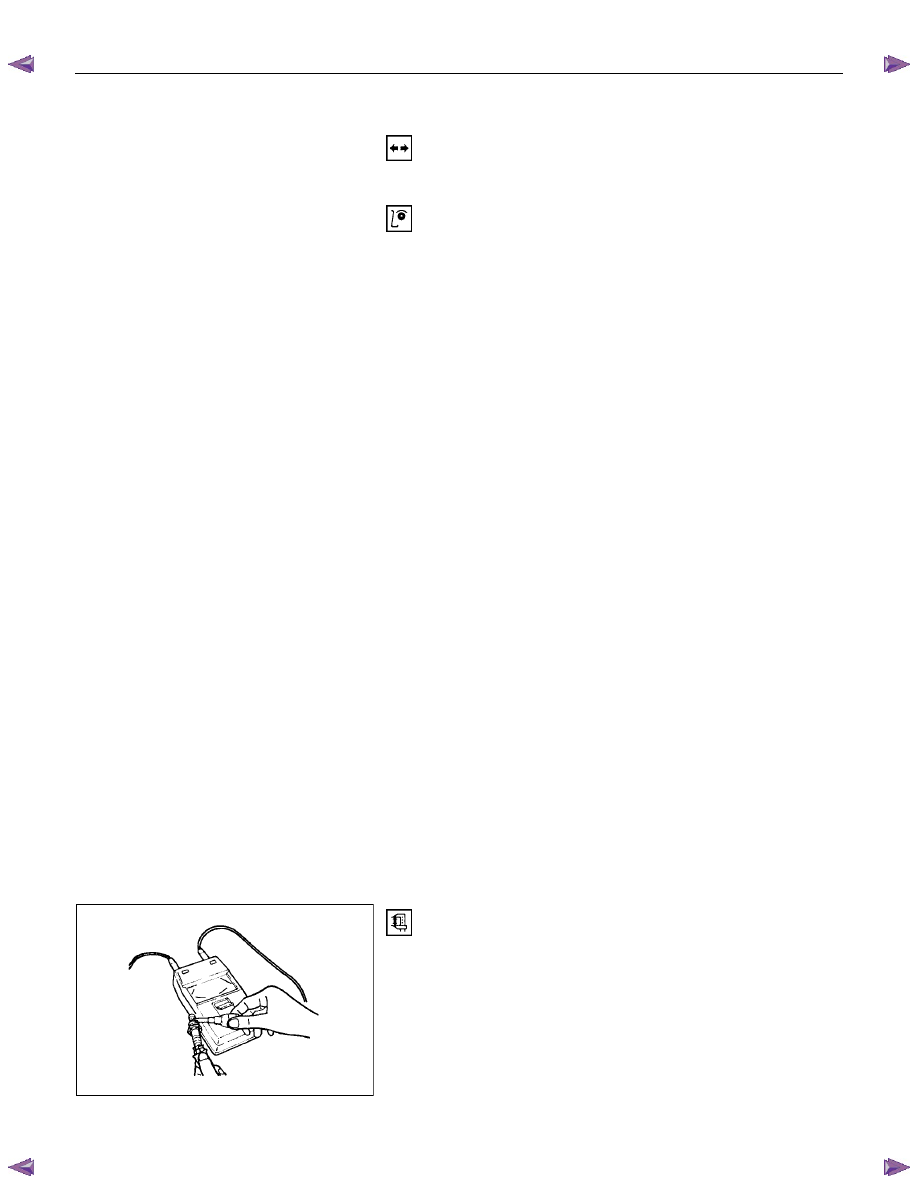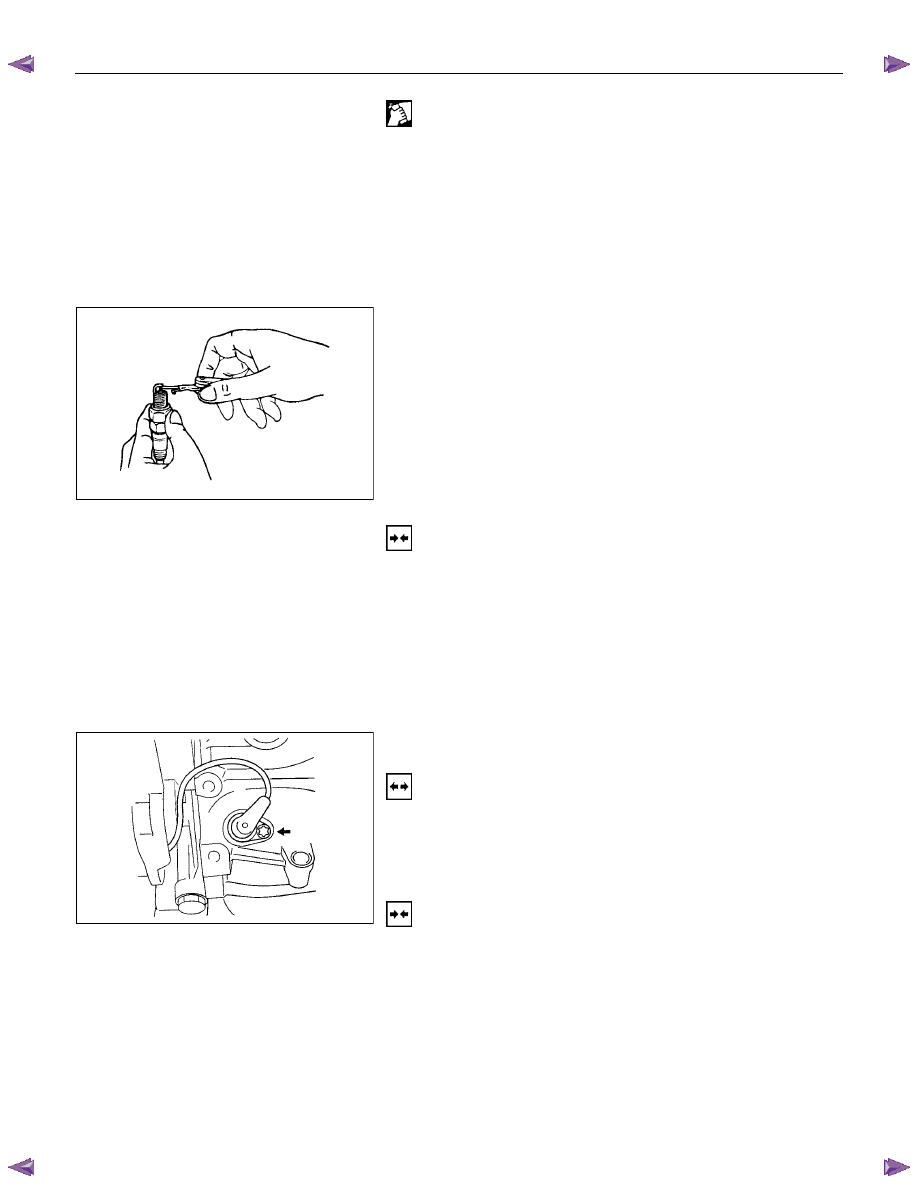Isuzu KB P190. Manual — part 536
IGNITION SYSTEM 6D2-1
SECTION 6D2
IGNITION SYSTEM
TABLE OF CONTENTS
PAGE
General Description . . . . . . . . . . . . . . . . . . . . . . . . . ... 6D2- 2
Service Precaution . . . . . . . . . . . . . . . . . . . . . . . . . . . 6D2- 2
Diagnosis . . . . . . . . . . . . . . . . . . . . . . . . . . . . . . 6D2- 2
Ignition Coil. . . . . . . . . . . . . . . . . . . . . . . . . . . . . . 6D2- 2
Removal . . . . . . . . . . . . . . . . . . . . . . . . . . . . . .. 6D2- 2
Installation. . . . . . . . . . . . . . . . . . . . . . . . . . . . .. 6D2- 2
Spark Plug. . . . . . . . . . . . . . . . . . . . . . . . . . . . . ... 6D2- 3
Removal . . . . . . . . . . . . . . . . . . . . . . . . . . . . . .. 6D2- 3
Inspection and Repair . . . . . . . . . . . . . . . . . . . . . . . ... 6D2- 3
Installation. . . . . . . . . . . . . . . . . . . . . . . . . . . . .. 6D2- 4
Crankshaft Angle Sensor. . . . . . . . . . . . . . . . . . . . . . . ... 6D2- 4
Removal . . . . . . . . . . . . . . . . . . . . . . . . . . . . . .. 6D2- 4
Installation. . . . . . . . . . . . . . . . . . . . . . . . . . . . .. 6D2- 4
Main Data and Specifications. . . . . . . . . . . . . . . . . . . . . . 6D2- 5

6D2-2 IGNITION SYSTEM
General Description
Ignition is done by the Ignition Module that fires.
Since the cylinder on exhaust stroke requires less energy to
fire its spark plug, energy from the ignition coils can be utilized
to fire the mating cylinder on compression stroke.
A notch in the timing disc on the crankshaft activates the crank
angle sensor which then sends information such as firing order
and starting timing of ignition coil to the ECM.
By receiving signals such as crank position, engine speed,
water temperature and Manifold Absolute Pressure (MAP), the
ECM controls the ignition timing.
Service Precaution
CAUTION:
Always use the correct fastener in the proper location.
When you replace a fastener, use ONLY the exact part
number for that application. ISUZU will call out those
fasteners that require a replacement after removal. ISUZU
will also call out the fasteners that require thread lockers
or thread sealant. UNLESS OTHERWISE SPECIFIED, do
not use supplemental coatings (Paints, greases, or other
corrosion inhibitors) on threaded fasteners or fastener
joint interfaces. Generally, such coatings adversely affect
the fastener torque and the joint clamping force, and may
damage the fastener. When you install fasteners, use the
correct tightening sequence and specifications. Following
these instructions can help you avoid damage to parts
and systems.
Diagnosis
Refer to Section Drivability and Emissions for the diagnosis to
electronic ignition system (El system).
Ignition Coil
Removal
1. Disconnect battery ground cable.
2. Disconnect the Ignition coil connector.
3. Remove the ignition coil.
Installation
1. Install the ignition coil.
Connect ignition coil connector and ignition coil, then tighten
bolt to the specified torque.
Torque: 20 N
⋅m (2.0 kgf⋅m)
2. Connect battery ground cable.

IGNITION SYSTEM 6D2-3
Spark Plug
Removal
1. Remove spark plugs.
Inspection and Repair
The spark plug affects entire engine performance and
therefore its inspection is very important.
• Check electrode and insulator for presence of cracks, and
replace if any.
• Check electrode for wear, and replace if necessary.
• Check gasket for damage, and replace if necessary.
• Measure insulation resistance with an ohmmeter, and
replace if faulty.
• Adjust spark plug gap to 1.0 - 1.1 mm (0.027 in) - 0.8 mm
(0.031 in).
• Check fuel and electrical systems if spark plug is extremely
dirty.
• Use spark plugs having low heat value (hot type plug) if fuel
and electrical systems are normal.
• Use spark plugs having high heat value (cold type plug) if
insulator and electrode are extremely burned.
Sooty Spark Plugs
Much deposit of carbon or oil on the electrode and insulator of
spark plug reduces the engine performance.
Possible causes:
• Too rich mixture
• Presence of oil in combustion chamber
• Incorrectly adjusted spark plug gap
Burning Electrodes
This fault is characterized by scorched or heavily oxidized
electrode or blistered insulator nose.
Possible causes:
• Too lean mixture
• Improper heat value
Measuring Insulation Resistance
• Measure insulation resistance using a 500 volt megaohm
meter.
• Replace spark plugs if measured value is out of standard.
Insulation resistance: 50 M
Ω or more

6D2-4 IGNITION SYSTEM
Cleaning Spark Plugs
• Clean spark plugs with a spark plug cleaner.
• Raise the ground electrode to an angle of 45 to 60 degrees.
if electrode is wet, dry it gefore cleaning.
• After spark plug is thoroughly cleaned, check insulator for
presence of cracks.
• Clean threads and metal body with a wire brush.
• File the electrode tip if electrode is extremely worn.
• Bend the ground electrode to adjust the spark plug gap.
Installation
1. Spark plugs
• Tighten spark plugs to the specified torque.
Torque: 20 N
⋅m (2.0 kgf⋅m)
Crankshaft Angle Sensor
Removal
1. Disconnect battery ground cable
2. Disconnect the wiring connector from crankshaft angle
sensor.
3. Remove crankshaft angle sensor from cylinder block.
Installation
1. Install crankshaft angle sensor into the cylinder block.
Before installation, apply small amount of engine oil to the
O-ring.
Torque: 6 N
⋅m (0.6 kgf⋅m)
2. Reconnect wiring connector to crankshaft angle sensor.

Нет комментариевНе стесняйтесь поделиться с нами вашим ценным мнением.
Текст